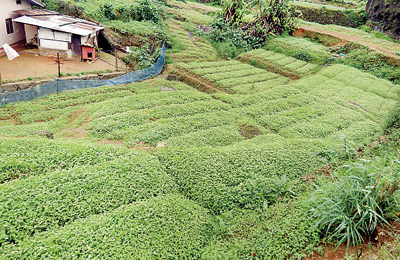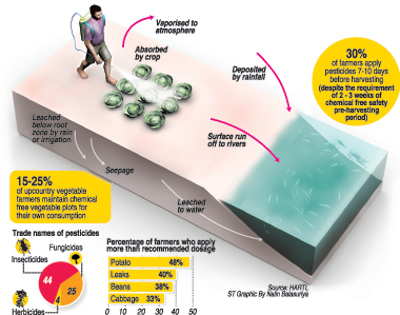News
Hidden poison in vegetable – agrochemicals
Reports of dicyandiamide (DCD) and whey protein allegedly found in milk powder have sparked widespread panic among consumers, but little do they know that vegetables they consume are equally if not more contaminated, according to a recent study on the use of agrochemicals by farmers.
The report based on an extensive survey in the upcountry says that although it has been advised that farmers should not use any chemicals 14 days prior to the harvesting of vegetables, some farmers do not follow this safety rule. Some 30% of upcountry farmers apply pesticides until 7-10 days before harvesting although some of them knew the harmful effects of agrochemicals, the report prepared by the Hector Kobbekaduwa Agrarian Research and Training Institute (HARTI) says.

Fit for human consumption? Vegetable plots in Nuwara Eliya
In a shocking revelation, the report also says that about a quarter of the famers surveyed maintain agrochemical-free vegetable plots for their own consumption. This dual approach adopted by these farmers, the report says, raises the question whether they are knowingly poisoning the consumers.
The report emphasises the urgent need to monitor pesticide residues in vegetables in the market. The report titled “HARTI Policy Brief on Minimising the Damages of Pesticides” is based on a field research conducted in the Badulla and Nuwara Eliya Districts among 240 randomly selected vegetable and potato farmers.
Only the main hill country crops potato, bean, leeks and cabbage were handpicked for the investigation by the HARTI researchers; but the outcome has been scary. Drawing attention to recent findings that linked the excessive use of agrochemicals by paddy farmers to the mystery Chronic Kidney Disease in the North Central Province, the report notes that vegetable also could contain arsenic and other harmful residues of agrochemicals.
The research also highlights the ignorance of farmers who overuse or misuse agrochemicals. According to the survey, nearly half of the upcountry famers apply pesticide as a precautionary measure even before any appearance of symptoms of pests or disease.
“The upcountry’s misty wet environment makes vegetable plants prone to pest attacks and fungal diseases. Farmers take their own decisions as to what pesticide to use and how frequently it should be used. Usually they end up in spraying an overdose,” said M.M.M. Abeeyar who led the team of researchers and authored the report together with M.T. Padmajani and M.A.C.S. Bandara.
Farmers who spoke to the Sunday Times said pesticides had lost their strength and often the instructions given on the label of the bottle were not useful.
Cabbage farmer Chamly complained that his crop was being attacked by a pest these days, but the pesticide he used was not answering. “The instructions on the label asked us to mix 28 units. We even doubled this dose – but the problem still persists,” he complained.
Pesticides Registrar Anura Wijesekera said they were testing on the quality of pesticides at the point of import. He advised the farmers to stick to the dose mentioned on the label.
He said pesticides varied and some took time to act and this was probably why some farmers question their strength and overuse them. With the correct dosage, the pest problem could be effectively dealt with. Dr. Wijesekera, however, noted that the quality of pesticides in the market should also be monitored.

Sarath Fernando, an official of the advocacy group, Movement for National Land and Agricultural Reform (MONLAR), said the dearth of agriculture officers to advise farmers had aggravated the problem. “Farmers just get advice from pesticide dealers or decide on a pesticide by following their neighbours. Earlier, there were enough agricultural officers to instruct farmers,” he said.
Mr. Fernando said vegetable could be grown successfully and profitably without any use of agrochemicals. The activist said agrochemicals killed both useful and harmful insects and the long term use would enable the pests to develop resistance to them.
Besides these direct harmful effects, agrochemicals also pollute waterways and groundwater sources.
The HARTI report recommends the setting up of pest clinics to advise farmers on the correct use of pesticides and alternatives methods. Following the Sunday Times report last week, several experts welcomed the Agriculture Minister’s move to authorise state officials including those in the health sector and Grama Niladharis to take legal action against those resorting to the indiscriminate use of pesticides and those who encourage this practice.
They also say there should be a mechanism to monitor and stop the sale of vegetable with pesticide residues. Until such steps are taken, consumers are advised to wash vegetables properly to minimise the harm. Pesticides are more harmful than DCD in milk powder, the experts say. They ask why the government is not taking prompt action in the same way it acted on the milk powder case.
Promote ‘Green Band’ pesticides
The Government banned the sale of some pesticides a few months ago. But upcountry farmers say the other pesticides are not as effective as the banned products.
Pesticides are colour coded based on their hazard levels and Class I pesticides or “Red band” pesticides are banned in Sri Lanka. Although Class II and Class III pesticides are largely used in Sri Lanka, farmers are advised to use the Class IV or ‘Green Band’ pesticides which are considered ‘least harmful’.
Green Band pesticides are effective as other class of pesticides but they take more time to attack the pests and are expensive. Therefore, farmers usually go for pesticides that give instant results.
Will overuse of agrochemicals bring another ‘Silent Spring’?
The impact of agrochemicals to biodiversity has long been established. Rachel Carson’s study – which came out as a famous book ‘Silent Spring’ in 1962 — showed how the use of DDT affected birds. She found out that the DDT that passed onto birds through the food chain made the shells of the eggs thin. Thus they broke prematurely due to the weight of the mother bird and this was identified as the cause for the decrease in the bird population.
But there can be lots of unknown impacts. The ‘National Red List 2012 on Conservation Status of the Fauna and Flora’ launched last year explains the possible impact of agrochemicals on animals and plants in Sri Lanka. The species associate in freshwater are the most vulnerable, according to the Red List.
It says the heavy use of agrochemicals has contributed to the population decline of at least two species of endemic fish, pethiya bandula and aplocheilus dayi (uda handaya) and several species of other fish. Even the washing to the pesticide tanks in waterways also affects these fish.
The excessive use of agrochemicals also poses a threat to the orchid populations, the Red List’s chapter on Orchids states. Pesticides’ impact on orchid pollinators in turn affects many other plant species. Amphibians, freshwater crabs, freshwater plants, dragonflies, reptiles, spiders, dung beetles are some of the other species that are affected by agrochemicals, according to the Red List.
Application of insecticides and weedicides should be carried out in a manner that would have the least effect, especially on pollinators such as bees – the Red List says. Measures such as application of insecticides prior to flowering and at a time of the day when bees are less active on flowers would minimize their exposure to such chemicals, it says.
All pesticides approved for release in Sri Lanka should be assessed for impact on non-target organisms and the environment in general, and the labelling of such products should include information on environmental safeguards, it recommends.
comments powered by Disqus
